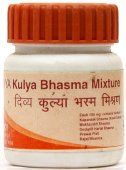Pishti, Piṣṭi: 6 definitions
Introduction:
Pishti means something in Hinduism, Sanskrit. If you want to know the exact meaning, history, etymology or English translation of this term then check out the descriptions on this page. Add your comment or reference to a book if you want to contribute to this summary article.
The Sanskrit term Piṣṭi can be transliterated into English as Pisti or Pishti, using the IAST transliteration scheme (?).
In Hinduism
Ayurveda (science of life)
Source: Academia.edu: Ayurveda and PharmaceuticsPiṣṭi (Flour or Powder): This is prepared by triturating the medicinal raw material with specified liquids and exposing to sun or moon. Fire is not used in this process, therefore they are known as anagnitapta. After the purification of the drug it is triturated with rose water or any other liquid for a day and dried in the sun for another day. This process continues for a week or so. On the last day piṣṭi is obtained. Example: Pravāla-piṣṭi, medicament made from coral used in fevers, gastritis and hemorrhage.
Source: gurumukhi.ru: Ayurveda glossary of termsPiṣṭi (पिष्टि):—A process in which the material through rubbing etc made them to lose their original shape and attains a dry fine powder

Āyurveda (आयुर्वेद, ayurveda) is a branch of Indian science dealing with medicine, herbalism, taxology, anatomy, surgery, alchemy and related topics. Traditional practice of Āyurveda in ancient India dates back to at least the first millenium BC. Literature is commonly written in Sanskrit using various poetic metres.
Languages of India and abroad
Sanskrit dictionary
Source: Cologne Digital Sanskrit Dictionaries: Cappeller Sanskrit-English DictionaryPiṣṭi (पिष्टि).—[feminine] powder.
Source: Cologne Digital Sanskrit Dictionaries: Monier-Williams Sanskrit-English Dictionary1) Piṣṭī (पिष्टी):—[from piṣṭa > piṣ] a f. See sub voce
2) Piṣṭi (पिष्टि):—[from piṣ] f. powder, [Rasendracintāmaṇi]
3) Piṣṭī (पिष्टी):—[from piṣ] b f. flour, meal, [Bhāvaprakāśa]
[Sanskrit to German]
Sanskrit, also spelled संस्कृतम् (saṃskṛtam), is an ancient language of India commonly seen as the grandmother of the Indo-European language family (even English!). Closely allied with Prakrit and Pali, Sanskrit is more exhaustive in both grammar and terms and has the most extensive collection of literature in the world, greatly surpassing its sister-languages Greek and Latin.
Kannada-English dictionary
Source: Alar: Kannada-English corpusPiṣṭi (ಪಿಷ್ಟಿ):—[noun] = ಪಿಷ್ಟ - [pishta -] 1.
Kannada is a Dravidian language (as opposed to the Indo-European language family) mainly spoken in the southwestern region of India.
See also (Relevant definitions)
Starts with: Pishtika, Pishtikri, Pishtirasa.
Ends with: Muktapishti, Nashtapishti, Saupishti, Vipishti.
Full-text (+2): Pishtirasa, Pishtikri, Vipishti, Nashtapishtikri, Prishthibhu, Viprishthibhu, Arkharôkh, Laraôkh, Lamkhamôr, Lonkhar, Arkheôkh, Kharakhar, Akhrôkhar, Markhour, Xarmarôkh, Outer Darkness, Rhôkhar, Khrêmaôr, Enkhthonin, Twelve Governors.
Relevant text
Search found 6 books and stories containing Pishti, Piṣṭi, Pisti, Piṣṭī; (plurals include: Pishtis, Piṣṭis, Pistis, Piṣṭīs). You can also click to the full overview containing English textual excerpts. Below are direct links for the most relevant articles:
Rasa Jala Nidhi, vol 1: Initiation, Mercury and Laboratory (by Bhudeb Mookerjee)
Part 1 - Definitions of technical terms < [Chapter VII - Enumeration of technical terms]
The Gods of the Egyptians Vol 1 (by E. A. Wallis Budge)
Folk Tradition of Bengal (and Rabindranath Tagore) (by Joydeep Mukherjee)
Charaka Samhita and Sushruta Samhita (by Nayana Sharma)
Processing of medicines < [Chapter 7]
Rasa Jala Nidhi, vol 5: Treatment of various afflictions (by Bhudeb Mookerjee)
Related products
(+23 more products available)





